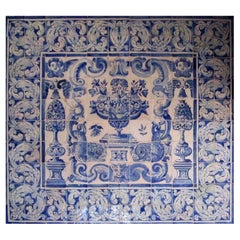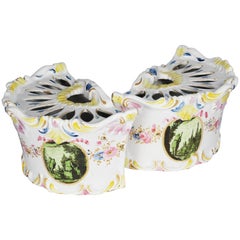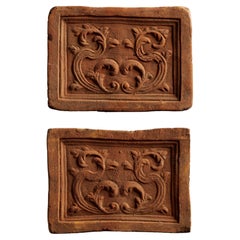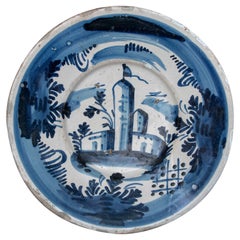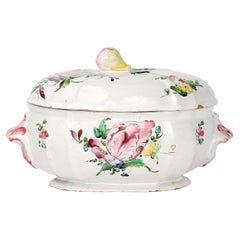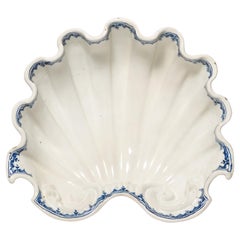18th Century and Earlier Ceramics
to
45
425
425
1,440
6,928
1,809
952
4,182
1,096
124
41
277
360
207
856
1,114
512
191
71
97
24
24
22
4
2
1
1
1
1
421
118
108
48
17
297
113
319
87
83
79
74
425
425
425
21
11
11
9
7
Period: 18th Century and Earlier
17th Century Portuguese " Azulejos " Panel " Vase "
Located in Madrid, ES
Largest collection of Portuguese tiles in the world
17th century Portuguese " Vase "
Measures: 160cm x 146cm
110 tiles
Important note: This panel is with the tiles restored 17th c...
Category
Portuguese Baroque Antique 18th Century and Earlier Ceramics
Materials
Ceramic
Pair of Ancient Italian Maiolica Flower Pots Milan, Rubati Factory, 1770 circa
Located in Milano, IT
Maiolica flower pot “a mezzaluna”
decorated with trompe l’oeil
Pasquale Rubati Factory
Milan, circa 1770
Measures: each 4.7 in (cm 12) x 5 in (c...
Category
Italian Rococo Antique 18th Century and Earlier Ceramics
Materials
Maiolica
Beautiful Antique Earthenware Tiles with Foliage
Located in Leuven , BE
Set of beautiful moulded tiles made of earthenware. Featuring flowerheads and foliage, this set of antiques creates a universe on its own.
Category
Antique 18th Century and Earlier Ceramics
Materials
Earthenware
$286 Sale Price / set
40% Off
18th Century Spanish Ceramic Plate with Architectural Scene
Located in Marbella, ES
18th century Spanish ceramic Plate with Architectural scene.
Category
Spanish Antique 18th Century and Earlier Ceramics
Materials
Ceramic
Italian Maiolica Tureen, Rubati Manufacture, Milan, circa 1770-1780
Located in Milano, IT
Maiolica tureen
Pasquale Rubati Manufacture
Milan, circa 1770 - 1780
Maiolica polychrome decorated “a piccolo fuoco” (third fire).
It measures 6.69 in x 11,02 x 8.26 (17 x 28 x ...
Category
Italian Rococo Antique 18th Century and Earlier Ceramics
Materials
Maiolica
Ancient Italian Maiolica Faenza, Ferniani Factory, Circa 1700
Located in Milano, IT
Centerpiece white maiolica shell
Ferniani factory, early period: 1693-1776
Faenza, circa 1700
Measures: 5.6 in x 14.72 in x 13.46 in (14.3 cm x 37.4...
Category
Italian Baroque Antique 18th Century and Earlier Ceramics
Materials
Maiolica
Mid-18th Century Pair of Delft Polychrome Plates
Located in Chapel Hill, NC
Mid-18th century pair of Delft polychrome plates, Dutch. Each with a central rose and repetitive entwined motif decorative border. Typical fritted edges. Charming & unusual. 8 7/8" d...
Category
Dutch Aesthetic Movement Antique 18th Century and Earlier Ceramics
Materials
Ceramic
Large Delft Blue and White Charger, Late 17th Century
Located in New York, NY
Possible signature of Jan Jansz van der Laen.
Category
Danish Antique 18th Century and Earlier Ceramics
Materials
Ceramic
(12) Four Portuguese Tiles 17th Century (1630/1680) Very Rare Collectible
Located in Madrid, ES
(4) Four Portuguese Tiles 17th Century (1630/1680) Very Rare Collectible
each tile 14cm x 14cm
total: 28cm x 28cm
Original, unrestored
Ready to hang on the wall
The old Portugue...
Category
Portuguese Baroque Antique 18th Century and Earlier Ceramics
Materials
Ceramic
Four Italian Ancient Dishes, Antonio Ferretti, Lodi, circa 1770-1780
Located in Milano, IT
Assortment of 4 dishes with braided rim
Antonio Ferretti Manufacture
Lodi, circa 1770-1780
Maiolica polychrome decorated “a piccolo fuoco” (third fire).
Measures: 14 x 10 in (35.5 x 25.5 cm);
12.2 x 8.39 in (31 x 21.3 cm);
10.4 x 9.65 in (26.5 x 24.5 cm);
10.8 x 9.61 in (27.5 x 24.4 cm).
Weight: 4.4 lb (1.998 kg)
State of conservation: some chips due to use on the edges and on the parts in relief.
The four different dishes have a foot with a low lip from which extends a wide, flat, slanted rim resembling a basket weave. The small handles are painted green: they resemble wickerwork in the two oval dishes and take the form of a sinuous branch in the round ones.
The third fire decoration is inspired by the naturalistic floral botanical patterns on the ceramics produced by the Hannong family in Strasbourg. Here the pattern is defined by the rapidity and subtlety of the brushstrokes and the result is particularly tasteful, characterized by compositional intelligence and pictorial expertise.
A main corolla, either a wild or garden rose, is set slightly off center in each well. From this extends a thin stem holding a small secondary bud and there are small field florets dotting the composition to lend volume to the delicate bunch of flowers.
On the brim, small polychrome flowers add color to the weave, accompanied by lanceolate leaves of a very intense green.
There exist few and very rare examples for comparison with this morphology: a round plate - entirely consistent with those in question - has been dated to around 1775 (S. Levy, Maioliche settecentesche lombarde e venete, Milano 1962, tav. 200). Two other dishes with a basket rim, but with parallel striped brim decoration, were exhibited in the 1995 exhibition on Lodi ceramics; the attribution to the Lombard town near Milan is therefore almost exclusively derived from the decoration called "alla rosa contornata" or "alla vecchia Lodi" and constitutes one of the most popular decorations during the eighteenth century. (M. L. Gelmini, in Maioliche lodigiane del '700 (cat. mostra Lodi), Milano 1995, pp. 31 p. 162-163 nn. 181-182).
This decorative choice represented a strong point of the Lodi factory, which established itself thanks to the vivid nature of the colors made possible by the introduction of a new technique perfected by Paul Hannong in Strasbourg and which Antonio Ferretti introduced in Italy. This production process, called “piccolo fuoco” (third fire), allowed the use of a greater number of colors than in the past; in particular, the purple of Cassius, a red made from gold chloride, was introduced. Its use allowed for many more tones and shades, from pink to purple.
The Ferretti family had started their Maiolica manufacturing business in Lodi in 1725.
The forefather Simpliciano had started the business by purchasing an ancient furnace in 1725 and, indeed, we have evidence of the full activity of the furnaces from April of the same year (Novasconi-Ferrari-Corvi, 1964, p. 26 n. 4). Simpliciano had started a production of excellence also thanks to the ownership of clay quarries in Stradella, not far from Pavia. The production was so successful that in 1726 a decree of the Turin Chamber came to prohibit the importation of foreign ceramics, especially from Lodi, to protect internal production (G. Lise, La ceramica a Lodi, Lodi 1981, p. 59).
In its initial stages, the manufacture produced maolicas painted with the “a gran fuoco” (double fire) technique, often in turquoise monochrome, with ornamentation derived from compositional modules in vogue in Rouen in France. This was also thanks to the collaboration of painters like Giorgio Giacinto Rossetti, who placed his name on the best specimens next to the initials of the factory.
In 1748 Simpliciano made his will (Gelmini, 1995, p. 30) appointing his son Giuseppe Antonio (known as Antonio) as universal heir. After 1750, when Simpliciano passed away, Antonio was directly involved in the Maiolica factory, increasing its fortunes and achieving a reputation on a European level. Particularly important was the aforementioned introduction in 1760 of the innovative “a piccolo fuoco” (third fire) processing, which, expanding the ornamental repertoire with Saxon-inspired floral themes, could commercially compete with the German porcelains that had one of its most renowned offerings in the naturalistic Deutsche Blumen. Antonio Ferretti understood and promoted this technique and this decoration, proposing it in a fresher and more corrective version, less linked to botanical tables...
Category
Italian Neoclassical Antique 18th Century and Earlier Ceramics
Materials
Maiolica
18th Century Italian Maiolica Centerpiece Bassano Venice, circa 1750
Located in Milano, IT
Maiolica centerpiece
Pasquale Antonibon factory
Nove di Bassano, Venice, 1740-1770.
Measures: 1.85 in x 19.21 in x 15.27 in
4.7 cm X 48.8 cm X 38.8 cm.
lb 5.29 (kg 2.4)
State of conservation: thin passing fêlure with covered chipping and a glued foot
The Antonibon were an important family of Venetian...
Category
Italian Baroque Antique 18th Century and Earlier Ceramics
Materials
Maiolica
(12) Four Portuguese Tiles 17th Century (1630/1680) Very Rare Collectible
Located in Madrid, ES
(4) Four Portuguese Tiles 17th Century (1630/1680) Very Rare Collectible
each tile 14cm x 14cm
total: 28cm x 28cm
Original, unrestored
Ready to hang on the wall
The old Portugue...
Category
Portuguese Baroque Antique 18th Century and Earlier Ceramics
Materials
Ceramic
Ancient Pair Coffee Pots, Pasquale Rubati Manufacture Milan, 1770 circa
Located in Milano, IT
Pair of small coffee pots.
Manufacture of Pasquale Rubati
Milan, 1770 Circa
Maiolica polychrome decorated “a piccolo fuoco” (third fire).
a) height 7.87 x 5.51 x 3.93 in (20 x 14 x ...
Category
Italian Neoclassical Antique 18th Century and Earlier Ceramics
Materials
Maiolica
Ancient Maiolica Coffee Set “Barbotine” Decoration Milan, 1770- 1780
Located in Milano, IT
Coffee assortment with “barbotine” decoration
Manufacture of Pasquale Rubati or Felice Clerici
Milan, 1770- 1780
Maiolica polychrome decorated “a piccolo fuoco” (third fire).
...
Category
Italian Rococo Antique 18th Century and Earlier Ceramics
Materials
Maiolica
18th Century Portuguese "Azulejos" Panel "Sculpture"
Located in Madrid, ES
Largest collection of Portuguese tiles in the world
18th century Portuguese " Azulejos " Sculpture"
Measures: 128cm x 143cm
90 tiles
Important note: This panel is with the tiles re...
Category
Portuguese Baroque Antique 18th Century and Earlier Ceramics
Materials
Ceramic
Antique Italian Maiolica Coolers Pasquale Rubati Manufacture Milan, 1770 Circa
Located in Milano, IT
Assortment of bottle and glass coolers in Maiolica.
Pasquale Rubati manufacture
Milan, circa 1770
Maiolica polychrome decorated “a piccolo fuoco” (third fire)
a - Bottle cooler
5.91 in x 5.91 in diameter (15 x 15 cm )
Weight: 1.86 lb (845 g)
b - Bottle cooler
6.89 x 7.87 in diameter (17,5 x 20 cm)
Weight: 2.09 lb (948 g)
c - Pair of glass-cooler vases
3.94 x 3.94 in diameter (10 x 10 cm)
Weight: 1.43 lb (650 g)
Good state of conservation:
a - some chipping from use on the edge;
a - two fêlures covered on the edge;
c - one has deep chippings on the edge and the other a subtle fêlure.
Two Majolica factories were active in Milan in the 18th century. The first, starting from 1745, was owned by Felice Clerici; the other one by Pasquale Rubati from 1756. Rubati was in competition with Felice, whose worker he had been prior to opening his own workshop. On his death in 1796, the business was continued for a few more years by his son Carlo.
Recent studies have recognized Pasquale Rubati's contribution as the creator of "Strasbourg-style" decorations with their particularly joyful depictions. This style had previously been attributed to the Lodi manufacturers. These works here, however, are a clear example of this production.
The Majolica containers have different sizes, a cylindrical shape and rest on a low foot ring. The two largest are completed by handles in the shape of a zoomorphic mask with wide open jaws, while the smaller ones have handles applied with an anthropomorphic mask.
All the works are characterized by elegant floral decoration.
The two twin glass coolers show bunches of flowers centered around a main corolla, a rose or a peony paired...
Category
Italian Rococo Antique 18th Century and Earlier Ceramics
Materials
Maiolica
Pair of Ming Dynasty Bowls with Pattern of Interlocking Hexagons
Located in Atlanta, GA
Pair of Ming Dynasty Bowls with Pattern of Interlocking Hexagons, Wanli period (1572-1620).
This handsome pair of bowls with a slightly fluted rim features an outer pattern of hexago...
Category
Chinese Ming Antique 18th Century and Earlier Ceramics
Materials
Porcelain
$1,500 Sale Price / set
39% Off
Four jugs with ceramic basins
Located in Milano, IT
The four jugs with their respective basins make up a homogeneous and visually very pleasing group as a whole, despite the fact that they do not share a common geographical origin.
T...
Category
Italian Louis XV Antique 18th Century and Earlier Ceramics
Materials
Ceramic
$7,163 / set
Japanese Ko-Seto Stoneware Ewer with Carved Design
Located in Atlanta, GA
On offer is a rare Ko-seto (old seto) stoneware ewer from Kamakura period (12-14th century) Japan. The exceptionally heavily potted ewer is made of stoneware. The main body was likely hand-coiled with individually built handle, sprout and wheel-made neck and mouth assembled. It takes the basic form from the contemporary Chinese ewer...
Category
Japanese Archaistic Antique 18th Century and Earlier Ceramics
Materials
Stoneware
Pair of 18th Century China East India Company Porcelain Plates
Located in PARIS, FR
Pair of 18th century East India Company famille rose porcelain plates with a polychrome and gilded decor of basket, flowers and bamboos.
Minor enamel ...
Category
Antique 18th Century and Earlier Ceramics
Materials
Porcelain
Set of Five 18th Century Hand Painted Delft Vases Including 3 Lidded Urns
Located in Dallas, TX
Set of five 19th century Hand painted delft vases including 3 Lidded Urns, also known as a garniture, elevate the blue & white art form to a special place, all having been hand-paint...
Category
Dutch Dutch Colonial Antique 18th Century and Earlier Ceramics
Materials
Porcelain
Spanish Charger c1700 with building decoration in the centre and outer decorated
Located in Bakewell, GB
Spanish Charger c1700 with building decoration in the centre and outer decorated rim. Old hanging retained on the back.
Diameter: 30 cm / 12”
Category
Spanish Antique 18th Century and Earlier Ceramics
Materials
Ceramic
Ceramic Drug Jar or Syrup Jar, Possibly Italy, 18th Century
Located in Madrid, ES
The decoration of ceramics in blue tones on a white background was common in Europe as far back as the 17th century (Dutch and English pieces, works in Talavera de la Reina in Spain,...
Category
Italian Neoclassical Antique 18th Century and Earlier Ceramics
Materials
Ceramic
Pair of Triton Candlesticks. Palmer C1780.
By Palmer
Located in Melbourne, Victoria
An exceptionally rare pair of Triton candlesticks, in black basalt with gold lustre. The design is copied from Wedgwood, who took it from Sir Willi...
Category
English Neoclassical Antique 18th Century and Earlier Ceramics
Materials
Stoneware
$6,000 Sale Price
20% Off
Set of Two 18th Century Spanish Hand Painted Glazed Ceramic Patterned Tiles
Located in Marbella, ES
Antique set of two 19th century Spanish hand painted glazed ceramic patterned tiles with white frame
Dimension do not include frame.
Category
Spanish Antique 18th Century and Earlier Ceramics
Materials
Ceramic
Pair Antique Japanese Artia Ceramic Cabinet Plates
By Arita
Located in Atlanta, GA
A pair of Japanese decorative ceramic plates, made in Arita for export market circa 17-18th century. The cabinet-display dishes feature lotus-petal gilt rim and a lavish tricolor ene...
Category
Japanese Japonisme Antique 18th Century and Earlier Ceramics
Materials
Ceramic
Basket-Weave Teapot in Black Basalt, Wedgwood C1790
By Wedgwood
Located in Melbourne, Victoria
A most attractive and unusual teapot in black basalt, moulded with basket-weave decoration and interlocking arches.
Exhibited: Wedgwood, Master Potter ...
Category
English Neoclassical Antique 18th Century and Earlier Ceramics
Materials
Stoneware
Oriental Flower Lamps
Located in New York, NY
Graceful pair of porcelain Oriental lamps hand-painted with garden scenes in rich orange and green color tones on a cream background. The main ...
Category
Chinese Antique 18th Century and Earlier Ceramics
Materials
Porcelain
$7,250 / set
18th Century Spanish Glazed Ceramic Tile from Triana in Blue and White
Located in Marbella, ES
18th Century Spanish Glazed ceramic tile from Triana in Blue and White of a Hand-Painted Horse.
Category
Spanish Antique 18th Century and Earlier Ceramics
Materials
Ceramic
Set of Decorative Tiles with Angels Blowing Horns
Located in Leuven , BE
Red earthenware set of tiles (3) with an abstract design surrounded by curvaceous ornaments. A charming and inspiring piece of art that can be used as a m...
Category
Antique 18th Century and Earlier Ceramics
Materials
Earthenware
18th Century Portuguese "Azulejos" Panel "Leisure Scene"
Located in Madrid, ES
Largest collection of Portuguese tiles in the world
18th century Portuguese " Azulejos " panel "Leisure Scene"
Measures: 126cm x 100cm
63 tiles
Important Note: This panel is with ...
Category
Portuguese Baroque Antique 18th Century and Earlier Ceramics
Materials
Ceramic
18th Century Portuguese "Azulejos" Panel "Contryside Scene"
Located in Madrid, ES
Largest collection of Portuguese tiles in the world
18th century Portuguese " Azulejos " Countryside Scene"
Measures: 204cm x 088cm
90 tiles
Important note: This panel is with the...
Category
Portuguese Baroque Antique 18th Century and Earlier Ceramics
Materials
Ceramic
18th Century Japanese Foliate Rimmed Bowl
Located in Atlanta, GA
18th century Japanese Kakiemon foliate rimmed bowl, Edo period (1603-1867). This charming bowl's decor shows a guardian lion ("shi shi") and a floral...
Category
Japanese Antique 18th Century and Earlier Ceramics
Materials
Porcelain
18th Century Portuguese " Azulejos " Panel "Countryside Scene"
Located in Madrid, ES
Largest collection of Portuguese tiles in the world
18th Century Portuguese " Azulejos " Countryside Scene"
Measures: 187cm x 153cm
80 tiles
IMPORTANT NOTE: This panel is with the...
Category
Portuguese Baroque Antique 18th Century and Earlier Ceramics
Materials
Ceramic
18th Century Cafe au Lait Porcelain Cup with Blue and White Interior
Located in Atlanta, GA
18th century porcelain cup, Qianlong period (1735-1796) of the Qing Dynasty.
This elegant cup has a nearly iridescent cafe au lait (light brown) exterior glaze and blue and white in...
Category
Chinese Antique 18th Century and Earlier Ceramics
Materials
Porcelain
Pair of Vienna Green Ground Ice Pails, circa 1780
Located in New York, NY
With covers and liners. Marked with under glaze blue shield mark.
Category
Austrian Antique 18th Century and Earlier Ceramics
Materials
Porcelain
Four small and rare English delftware lobed dishes, London, ca. 1700
Located in Charlottesville, VA
Four English delftware lobed dishes, ca. 1700. London examples. 8- 8 7/8” diam.
Category
English Antique 18th Century and Earlier Ceramics
Materials
Delft
Traingular Spices Tray, Talavera de la Reina, Spain, 17th Century
Located in Madrid, ES
Triangular spice. Glazed ceramic. Talavera de la Reina, Spain, 17th century.
Has damage.
Triangular glazed ceramic spice rack decorated with a...
Category
Spanish Baroque Antique 18th Century and Earlier Ceramics
Materials
Ceramic
Beautiful Earthenware Tile with Floral Motifs and a Bird
Located in Leuven , BE
Lovely set of 5 antique earthenware tiles with an elegant pheasant surrrounnded by nature. Strong symbol of luck, imperial bird, the pheasant is associated with immortality and was often used as sepulchral symbol in early Christian art...
Category
Antique 18th Century and Earlier Ceramics
Materials
Earthenware
A Safavid blue and white pottery dish
Located in Lymington, Hampshire
A Safavid blue and white pottery dish, of shallow circular form decorated in underglaze blue with scattered rocky outcrops, within a panelled ri...
Category
Persian Antique 18th Century and Earlier Ceramics
Materials
Ceramic
17th Century Spanish Talavera Pharmacy Jar in Blue Glazed Ceramic
Located in Marbella, ES
17th Century Spanish Talavera pharmacy jar in Blue Glazed ceramic.
Category
Spanish Antique 18th Century and Earlier Ceramics
Materials
Ceramic
Villafeliche Jug, Aragon, Spain, 18th Century
Located in Madrid, ES
Late Baroque pottery jug made and decorated with high temperature glazes over a white slip of tin. These motifs are combined with enameled decorations in relief obtained mold. The typology of the piece combines Italian jug with handle ovoid belly and vertical bow, with the peak jug typically Spanish, characterized by the outgoing peak of the mouth. Decorations reveal the oriental influence, with large floral bouquets arranged asymmetrically and complex landscapes with architecture and palm trees, which remove some figures, such as totally Western. The reasons appear pincelados in manganese black, and colored with ocher, blue, green and red, mainly enamels. Aragon ceramic least a century old will be characterized by a strong own, combined with the influences of personality Talavera and Catalonia. You will have three main centers: Teruel, Muel and Villafeliche, the first two with tradition since the 16th century, and the third created in the late 17th century. The Villafeliche will generally be very popular ceramics...
Category
Spanish Neoclassical Antique 18th Century and Earlier Ceramics
Materials
Ceramic
18th Century Portuguese " Azulejos " Panel "The Boy and the Dog"
Located in Madrid, ES
18th century Portuguese " The Boy and the Dog " Sculpture "
Measures: 144cm x 173cm
120 tiles
Important note: This panel is with the tiles restored 18th century.
The panel is deliv...
Category
Portuguese Baroque Antique 18th Century and Earlier Ceramics
Materials
Ceramic
Early French Faience Figural Jug
Located in Charlottesville, VA
French Faience Figural Jug the unglazed underside with the 17th-century mark "F.C", possibly Marseilles, in the form of a woman seated upon a grassy mound, polychrome painted with a ...
Category
French Antique 18th Century and Earlier Ceramics
Materials
Ceramic, Faience
Black Basalt Teapot with Enamel Decoration, Probably Spode C1800
By Josiah Spode
Located in Melbourne, Victoria
Globular teapot in black basalt, painted with matt white, red and ice blue. Judging by the shape and general appearance, probably by Spode, in imitation of Wedgwood designs of the pe...
Category
English Neoclassical Antique 18th Century and Earlier Ceramics
Materials
Stoneware
Two Large 18th Century Chinese Export Porcelain Chargers
Located in Charlottesville, VA
Two large Chinese Export Porcelain Chargers, 18th Century, 15” diam. Having blue and gold decoration. Acquired from Jorge Welsh. In excellent condition. 1.75” h. x 15” diam.
Category
Chinese Antique 18th Century and Earlier Ceramics
Materials
Ceramic, Porcelain
18th Century Spanish Ceramic Plate with a Country Scene
Located in Marbella, ES
18th century Spanish Ceramic plate with a Country scene.
Category
Spanish Antique 18th Century and Earlier Ceramics
Materials
Ceramic
18th Century Portuguese " Azulejos " Panel "Countryside Scene"
Located in Madrid, ES
Largest collection of Portuguese tiles in the world
18th century Portuguese " Azulejos " Countryside Scene"
Measures: 121cm x 49cm
36 tiles
Important note: This panel is with the ...
Category
Portuguese Baroque Antique 18th Century and Earlier Ceramics
Materials
Ceramic
Pair of 18th Century Blue and White Dutch Delft Chargers
Located in Charlottesville, VA
Rare pair of 18th Century Dutch Delft Chargers, stylized blue and white floral decoration with yellow rims. 13.74” diam, 2” h.
Category
Antique 18th Century and Earlier Ceramics
Materials
Ceramic, Delft
17th Century Spanish Talavera Pharmacy Jar in Blue Glazed Ceramic
Located in Marbella, ES
17th century Spanish Talavera pharmacy jar in blue Glazed ceramic.
Category
Spanish Antique 18th Century and Earlier Ceramics
Materials
Ceramic
Qianlong period talismanic antique Chinese porcelain plate
Located in London, GB
Qianlong period talismanic antique Chinese porcelain plate
Chinese, 18th Century
Height 4cm, diameter 21cm
Made during the 18th century in Qianlong period China, this fine porcelain plate was made for the export market, in particular the Islamic world, and comes in the form of a talismanic plate with Arabic inscriptions. The centre is decorated with a magic square...
Category
Chinese Chinese Export Antique 18th Century and Earlier Ceramics
Materials
Porcelain
Dutch White Delft GADROONED Charger, Late 17th Century
Located in CH
Dutch White Delft GADROONED Charger
This late 17th Century Charger is made of white ceramic and decorated with a Gadrooning convex shape.
Holland has a great tradition of pottery...
Category
Dutch Baroque Antique 18th Century and Earlier Ceramics
Materials
Ceramic
Mixed Clay Ewer with Classic Decoration and Swan Handle Grammont Factory Orleans
By Grammont Ainé
Located in Argenteuil, IDF
Rarely ewer in mixed clay from the Orleans factory of Grammont Ainé(1764-1832)
End of the 18th century, around 1790
Very beautiful & rare zoomorphic ewer in earthenware mixed with ...
Category
French Louis XVI Antique 18th Century and Earlier Ceramics
Materials
Ceramic
$8,596 Sale Price
20% Off
Pair of English Porcelain Mini Cabbage Leaf Jugs, circa 1785
Located in New York, NY
With mask spout the sides moulded with upright leaves and painted with insects, foliated capped handle.
Category
English Antique 18th Century and Earlier Ceramics
Materials
Porcelain
Figure of a ram, Derby Porcelain Works, circa 1760
By Derby
Located in Melbourne, Victoria
Derby was able to produce exceptional work, as this figure of a recument ram attests. Skillfully sculpted, moulded and potted, there is something about the expression produced by the...
Category
English Rococo Antique 18th Century and Earlier Ceramics
Materials
Porcelain
Chamotte Vase by Gunnar Nylund
Located in Zurich, CH
Beautiful vase in Chamotte ceramic in blue glazed finish made for Rörstrand, the vases were made from the 1930 - 1960's - beautiful piece and in very good vintage condition
Category
Swedish Antique 18th Century and Earlier Ceramics
Materials
Ceramic
Blue and White Delft Charger, London
Located in Charlottesville, VA
Delft charger, London, painted in blue with a house in a stylized landscape, 18th Century. diam. 14.25 in.
Category
English Antique 18th Century and Earlier Ceramics
Materials
Ceramic
Hand-Painted Ceramic Jug with Lead Lid, Dated From 1762,
Located in Marbella, ES
Hand-Painted ceramic jug with lead lid, dated from 1762, initials G. and R. and signed at the bottom, with scenes of windmills and a house.
Category
Dutch Antique 18th Century and Earlier Ceramics
Materials
Lead
17th Century Spanish Talavera Pharmacy Jar in Blue Glazed Ceramic
Located in Marbella, ES
17th century Spanish Talavera pharmacy jar in blue glazed ceramic.
Category
Spanish Antique 18th Century and Earlier Ceramics
Materials
Ceramic
Four Chinese Export Famille Rose Botanical Plates, Qianlong Period (1736-1795)
Located in Ottawa, Ontario
A very attractive group of four 18th century Chinese export porcelain botanical plates apparently made for the French market, circa 1775.
Each plate having a scalloped rim banded wit...
Category
Chinese Qing Antique 18th Century and Earlier Ceramics
Materials
Porcelain
Recently Viewed
View AllMore Ways To Browse
19th Century Spanish Large Granada Fajalauza
Aspic Mold
Axel Salto Bowl With Sung Glaze
Bear Cookie Jar
Bitossi Arabesque
Ceramic Mermaids
Ceramic Tennis Set
Ceramic Toast Rack
Chinese Sweet Meat
Chris Gustin
Corning Ware
Dansk Coffee Pot
Deldare Buffalo
Egg Pol Chambost
Eva Zeisel Museum
Faience Stein
Flintstone Cookie Jar
Fornasetti Fiat
